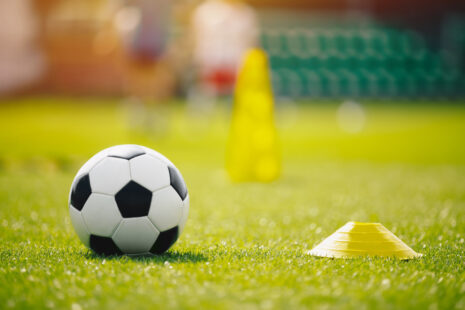When injured, it’s vital to prioritize your recovery and follow the advice of healthcare professionals to ensure proper healing. You can still work on improving various aspects of your soccer skills and knowledge even while injured.
Here are some ways to get better at soccer while injured…
- Study the Game – Take the time to watch soccer matches, analyze tactics, and study the techniques of professional players. Observing the game can improve your understanding of strategy and decision-making.
- Mental Training – Engage in mental exercises and visualization techniques to enhance your soccer IQ, improve focus, and stay mentally sharp.
- Nutrition and Hydration – Pay attention to your nutrition and hydration, as proper fueling can support the healing process and maintain your overall fitness.
- Work on Your Weaknesses – Use this time to address any weaknesses in your game. If you have a particular area of your game that needs improvement (e.g., shooting, passing, dribbling), focus on specific drills that target those skills.
- Strength and Conditioning – If allowed by your healthcare professional, work on strength and conditioning exercises that don’t aggravate your injury. Focus on strengthening other parts of your body to maintain overall fitness and prevent deconditioning.
- Rehabilitation and Physical Therapy – Be diligent with your rehabilitation exercises and physical therapy sessions to aid in your recovery and regain strength and mobility.
- Stay Engaged with Your Team – Attend team practices and matches if possible, even if you can’t participate fully. Staying connected with your teammates and coaches can keep you mentally involved in the game.
- Consult with Your Coach – Stay in communication with your coach about your progress and receive feedback on areas of improvement for when you’re ready to return.
- Stay Positive and Patient – Dealing with an injury can be frustrating, but maintaining a positive mindset and being patient with the recovery process is crucial.
- Learn from Injuries – Reflect on how the injury occurred and identify any patterns or factors that may have contributed to it. This self-awareness can help you make adjustments to prevent future injuries.
Healing and recovery should always be your priority when dealing with an injury. Avoid rushing back to the field before you have been cleared by your healthcare professional. It’s better to take the necessary time to recover fully and then gradually ease back into training and playing once you’re cleared to do so.
Use this time to focus on improving other aspects of your soccer game and maintaining your physical fitness. Being proactive and making the most of your time while injured can help you come back stronger and more prepared to excel on the soccer field.




